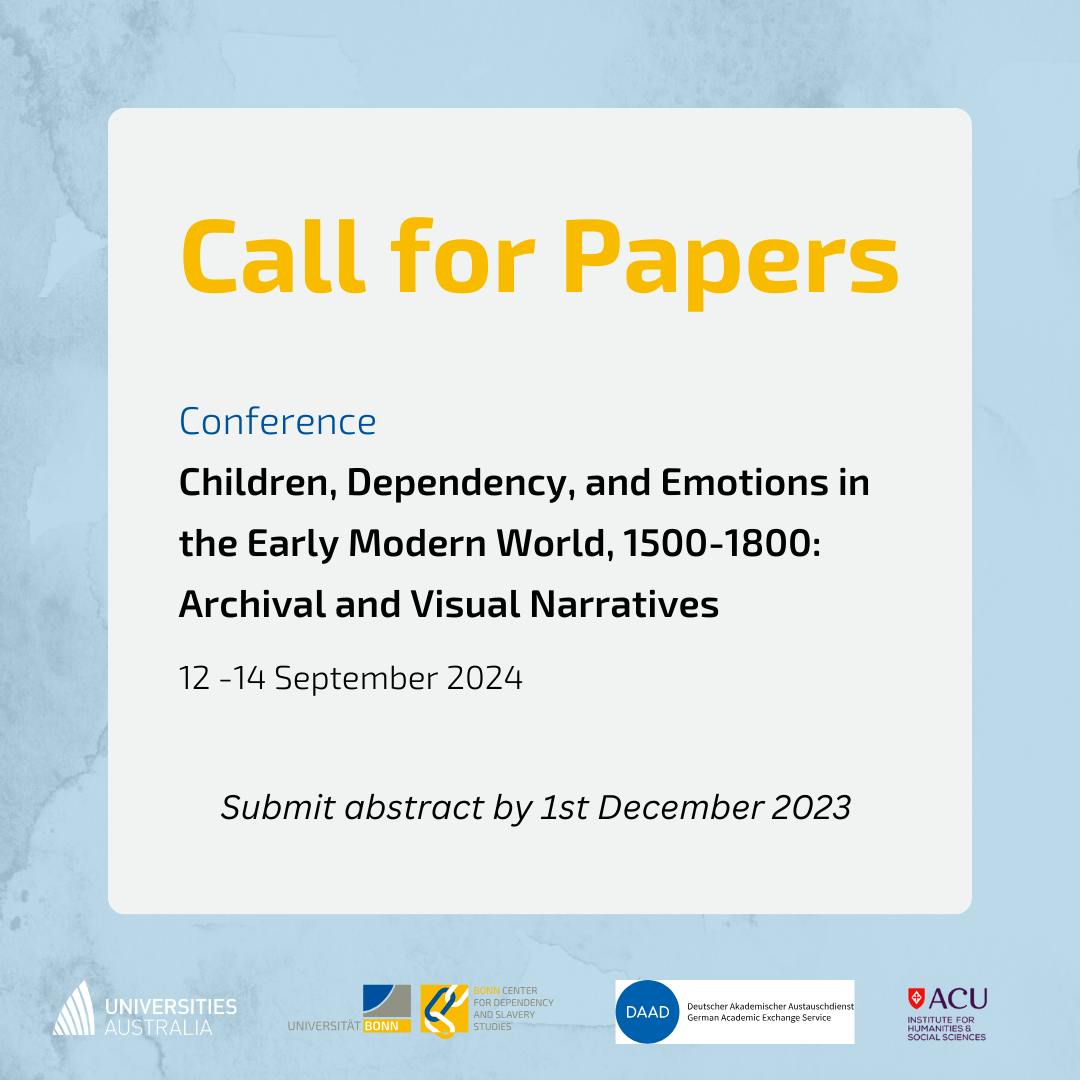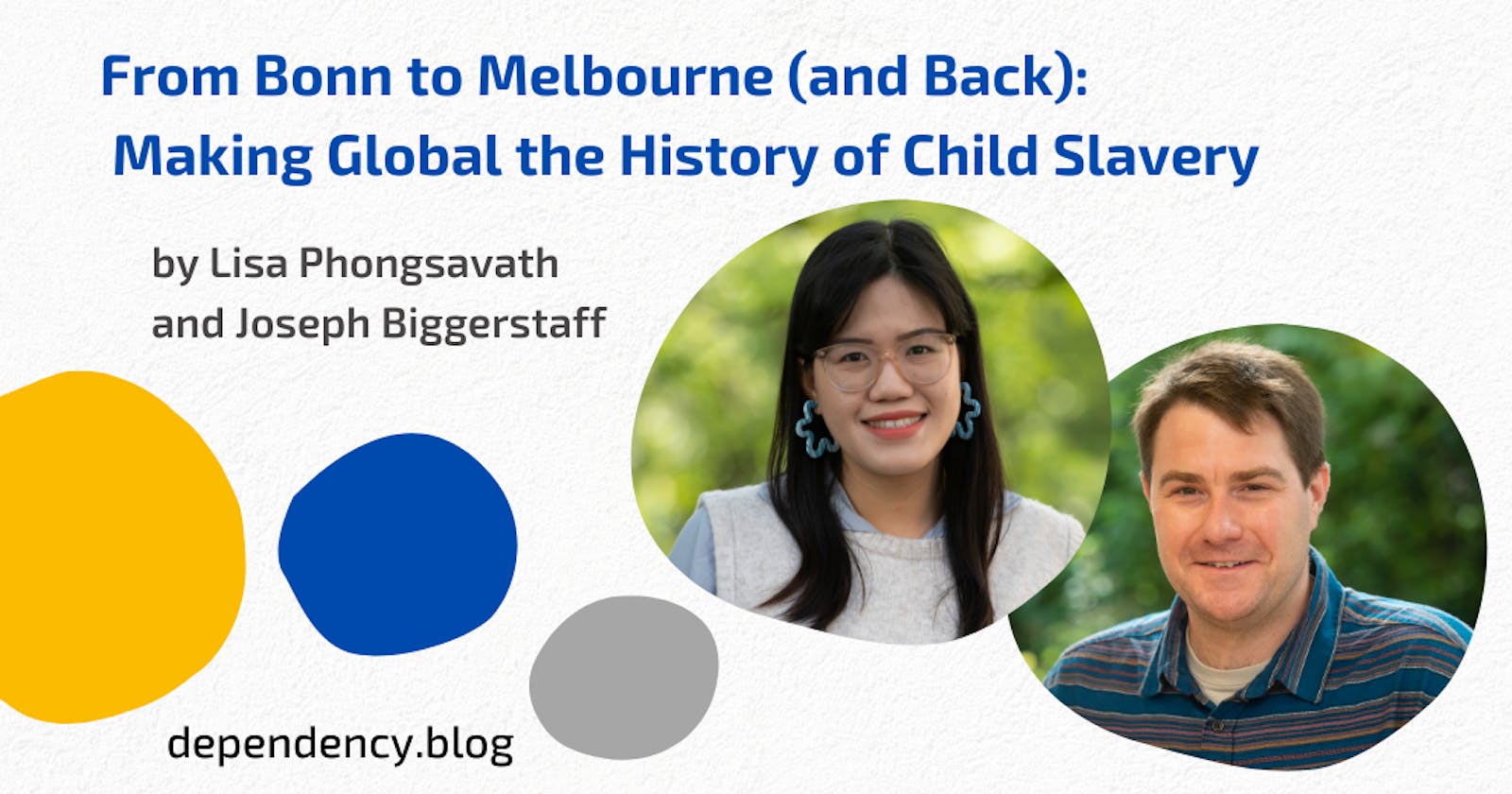From Bonn to Melbourne (and Back)
Making Global the History of Child Slavery
“As an Australian who has received most of my academic training in Germany, the Child Slaveries in the Early Modern World project has been a fortuitous opportunity to reconnect with and learn anew the Australian research landscape. I have appreciated immensely the exchange with project members in both Bonn and Melbourne and how we bring unique insights to each other’s work. I feel very much at home in this new intermediary space that we’re carving out together” (Lisa).
The two-year collaborative project Child Slaveries in the Early Modern World: Gender, Trauma, and Trafficking in Transcultural Perspective (1500-1800) is the brainchild of researchers from the Institute of Humanities and Social Sciences at the Australian Catholic University Melbourne and the BCDSS.
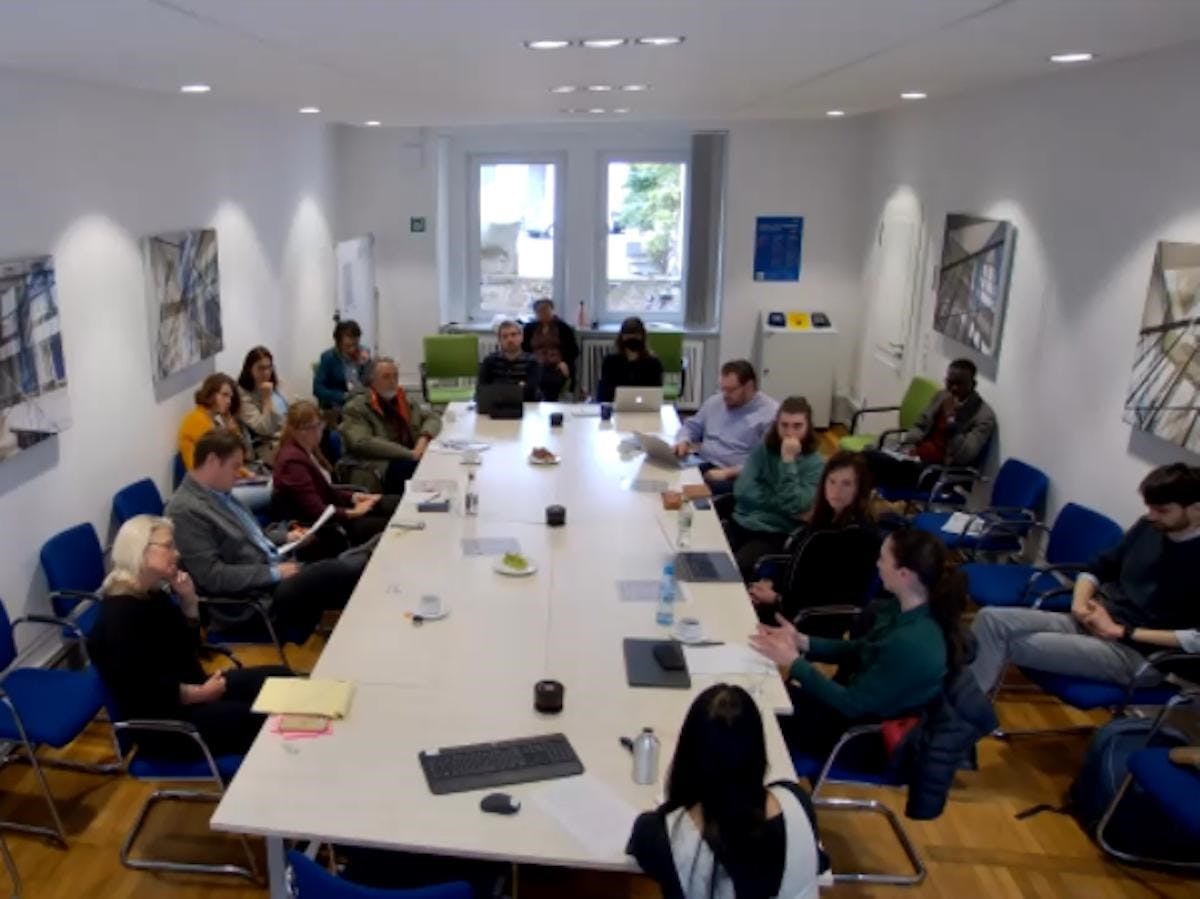
Screenshot of the “Child Slaveries in the Early Modern World” Workshop Discussion at the BCDSS in October 2023.
We bring together studies grounded in archival research and visual culture that explore historical dimensions of child slavery, dependency, and gender in a global perspective. The project is supported by a cooperation scheme of the Deutscher Akademischer Austauschdienst (DAAD) and Universities Australia (UA) that enables the mobility and promotes the development of early career researchers (ECRs). Through workshops, an international conference, and subsequent publication, we aim to illuminate significant changes in child slavery and dependency over time.
We assess how ideas and practices of children’s dependencies converged in the early modern period through connected geographies that are rarely examined together.
As with most things in academia, this ambitious project started with a funding application. But in our case, it took two applications that not only needed to match but required a synchronized submission to the respective funding bodies (DAAD in Germany and UA in Australia). It was a challenge simply to synchronize our agendas with the other ECRs (Jessica O’Leary and Kristie Flannery) and Australian project leader Susan Broomhall across time zones.
Since it was our first time participating in such an application process, we scratched our heads at the demands of the German documents, their project descriptions, planning summaries, and finance plans.
What would the output and impact be? What could we prove as success indicators? How might we ensure our project’s sustainability? The application forces you to clarify goals and outcomes that would normally emerge through the scholarly practice of cooperative research. We were given a realistic piece of advice when we were told, ‘You are selling promises with the application.’ We were thankful to receive so much guidance from our project partners as we dove head-first into the bureaucratic maze.
After much nail-biting, in late 2022, we finally heard from the DAAD that our application had been accepted! Celebrations were brief as we needed to get to work on concretely planning two workshops in the coming year. The following April, the entire Bonn contingent (Lisa, Joseph, and Claudia) landed in Melbourne. We were warmly welcomed into the offices of the Australian Catholic University in Melbourne near Fitzroy Gardens.
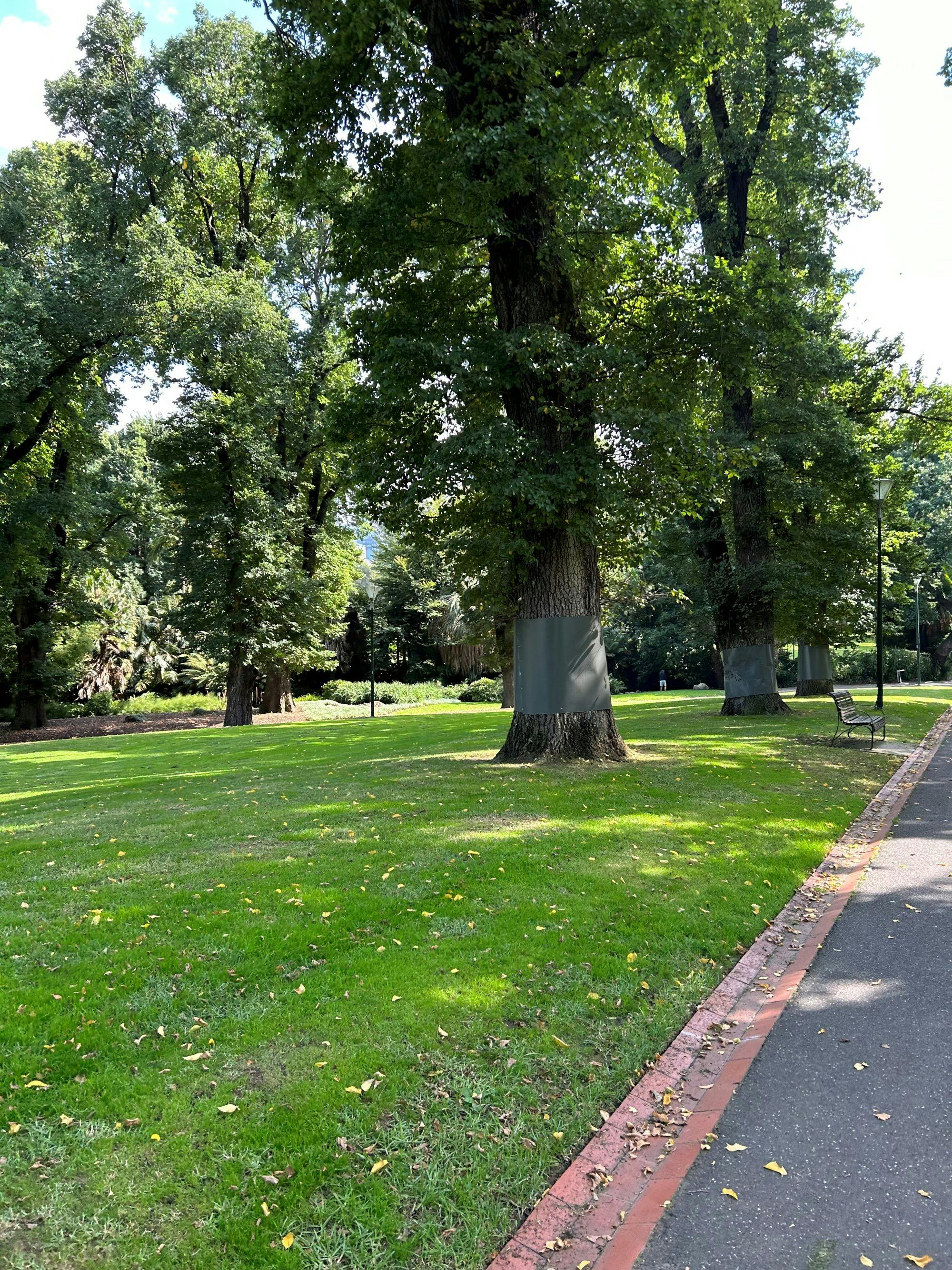
Fitzroy Gardens - Our Regular Haunt for Afternoon Strolls (photo by Lisa).
The ensuing public lecture by Claudia Jarzebowksi was well-attended. We were also invited to lunches, seminars, and reading groups, where we got to know the many brilliant scholars working at the ACU. Our first internal workshop together was challenging and productive.
The main question in the back of our heads was how to bring such seemingly different ways of knowing (history of emotions, studies of trauma, childhood, dependency studies, etc.) together into a single coherent tapestry.
Fresh from archival trips to Barbados and France, respectively, Joseph and Lisa proposed some possible directions that could take their sources into the project’s next phase. Kristie shared her ideas and the rich historiography on Spanish Manila. Jessica deepened our knowledge of the Jesuit presence in 16th-century Brazil. Meanwhile, Susan and Claudia arrived at a shared interest in the visual depiction of children in early-modern painting.
“I truly enjoyed my time visiting Australia, particularly meeting the nice people at the Australian Catholic University. It was interesting to experience a different academic culture where I felt recognized as a scholar, not merely a PhD at the bottom of a hierarchy. The feeling at the offices at the ACU was convivial and relaxed, even during the intense feedback sessions, including one generously offered by Jessica O’Leary, who provided some really useful advice and insight on our PhD projects. Outside of academia, visiting Australia was truly a pleasure, if not also a bizarre experience, as the economy was somehow not devastated by the economic collapse of 2009” (Joseph).
Despite the diversity of content and contexts, we uncovered how well our cases meld and intersect. We found overlaps through analogous sources, themes like the transcultural family, and through approaches that take local examples to access global dynamics. The group chemistry was palpable, and optimism for our collaboration ran high.
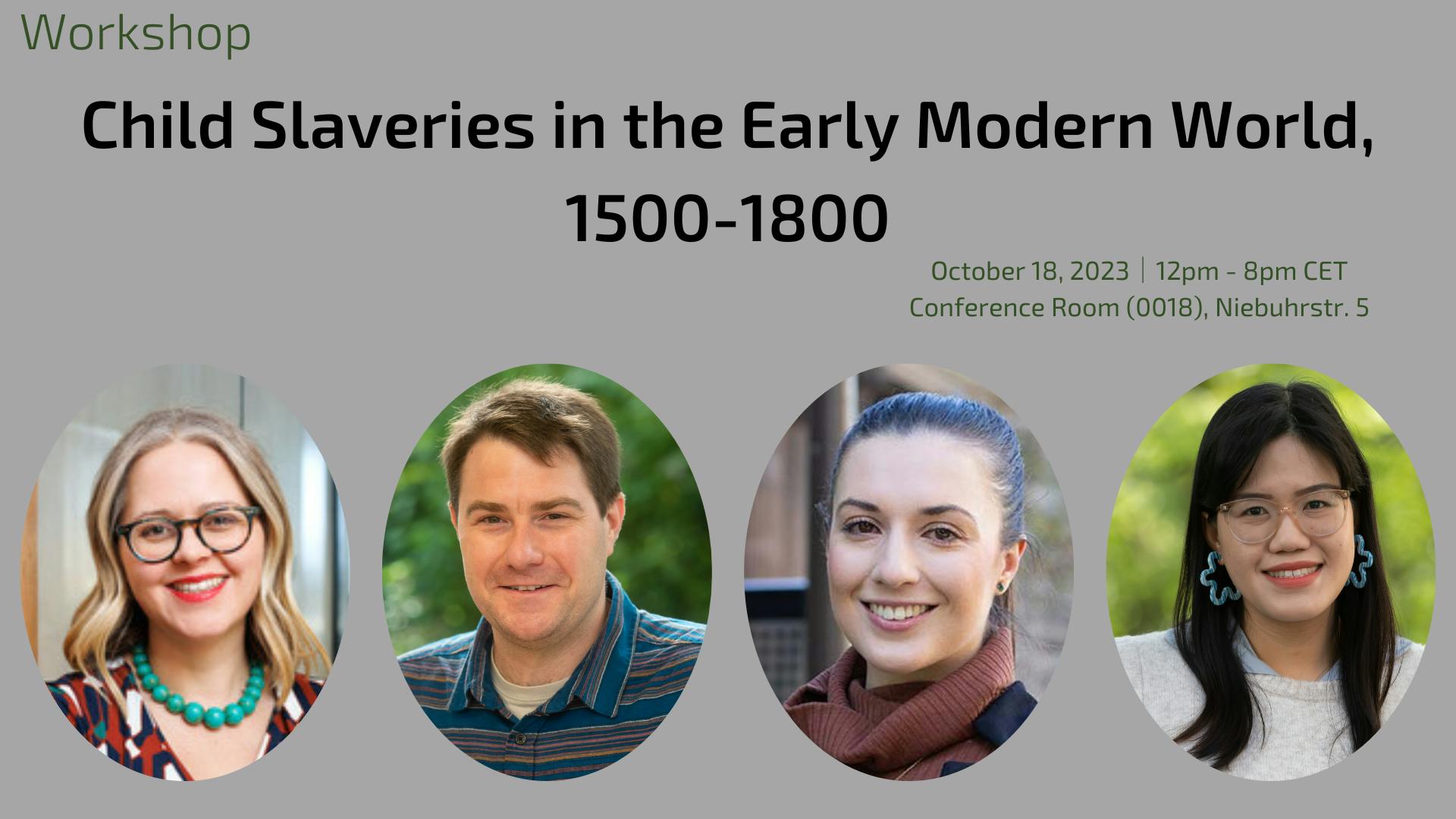
Teaser for the October 2023 Workshop at BCDSS.
A major step toward achieving the project’s aims was our public workshop in Bonn on 16th October 2023. The workshop took place over the course of an afternoon. It consisted of an introduction by the project Professors, Susan Broomhall and Claudia Jarzebowski, followed by two panel presentations by the ECRs.
We separated the panels on a spatial and archival level. We did not conceptualize spatiality in terms of geographical location but of terrain (archipelagos and mainlands) and each panel was archivally based on the use of similar sources.
Linking Asia and the Atlantic together in panels was a deliberate attempt to connect these usually separate spheres in slavery research.
The first set of papers by Kristie Flannery and Joseph Biggerstaff counterposed legal records (probate and litigation) with other sources (illustrations and maps) to examine the history of slavery and gendered dependency in the maritime spaces of Manila and Barbados.
Kristie guided us through the people and places of early modern Manila. We dove into Spanish colonial law and focused on a petition by a 14-year-old girl, Maria, which contested for a share of her father’s estate. Kristie’s discussion of the legal process and its emotional attempts to attest to parentage gave us much to contemplate regarding the divergent dependencies of women and children in the colonial legal system vis-a-vis that of ‘ordinary’ family structures.
Joseph’s presentation took us on a voyage to the Island of Barbados and into the haphazard yet domineering landscape of British property law as it was imposed onto its slavery society in the seventeenth and eighteenth centuries. Wills were the technologies employed to secure futures for the children of plantation owners as well as for the enslaved people consigned to them. Through legal terminologies of inheritance, Joseph presented an innovative analysis that charted a path toward the plurality of Atlantic slaveries.
Both papers in the first panel prompted an animated dialogue on shared themes and raised many important questions about the legal archive: Can we view inheritance as transculturally legible practice? Are legal documents in the early modern context representative of the rule of law, or more that of empire and slavery? Is it a cliché that historians find women, children, and enslaved people often only through probate records?
A second set of papers by Jessica O’Leary and Lisa Phongsavath similarly offered a creative mix of source work and analysis. Both projects drew from rich missionary archives to examine how childhood in the contact zones of interior Brazil and Ayutthaya were heterogeneous experiences. Jessica took up the mighty challenge of integrating the key concept of ‘strong asymmetrical dependency’ into her analysis of indigenous children under the coercive tutelage of Jesuit missionaries.
Focusing on the social practice of sayings and doings in colonial society was particularly illuminating. Through missionary records, we can also learn a lot about how children were central and sometimes centrifugal in mainland Southeast Asia.
Lisa followed the sometimes contingent trajectories of Catholic schoolboys as they navigated within and beyond colonial society and missionary networks. Her study shows that mainland Southeast Asia in the seventeenth and eighteenth centuries involved a mosaic of practices.
Importantly, both papers identified agency in the everyday and not within the binary of resistance and accommodation.
Sometimes unruly, children complicated the everyday business of missionary activities just as they trouble the label-making of historical practice.
The conference room was packed with students, early career scholars, and senior scholars alike, who contributed to lively discussions that continued well into the evening of the reception. We would like to thank all project members, attending colleagues, and especially Martina Kuhnert and Tobias Happ for their efforts in planning and ensuring the smooth running of our workshop in Bonn.
“I thoroughly enjoyed my time as a visitor at the BCDSS. The collegial and vibrant academic environment was ideal for our workshop. I was pleasantly surprised to see such a large group of scholars with such varying research interests and experiences. The resulting discussion was enriching and robust. I am very much looking forward to similar outcomes at our conference in 2024” (Jessica).
One major takeaway from our work on this project is the incalculable value of these collaborative endeavors.
Bringing people together from different academic and cultural spaces matters.
Thanks to the generous funding from the DAAD and Universities Australia, we are able to work through different kinds of global histories and combine the experience and expertise of research literally a world apart. In this vein, a major challenge remains for bringing early career researchers based in the Global South into such collaborative projects.
As the project’s second year approaches, we’re already gearing up for our next visit to Melbourne in March 2024 and preparing for our international conference, Children, Dependency, and Emotions in the Early Modern World, 1500-1800: Archival and Visual Narratives, which will be held in Bonn on 12-14th September 2024.
The event promises to be a memorable culmination of our two years of collaboration and cutting-edge research between the fields of childhood studies, dependency studies, global history, and the history of emotions. We look forward to consolidating the project’s already strong focus on archival research with visual sources and interdisciplinary approaches in our attempt to shine light onto children as seminal agents across the early modern globe.
The conference’s Call for Papers is open for submissions until 1st December 2023.
